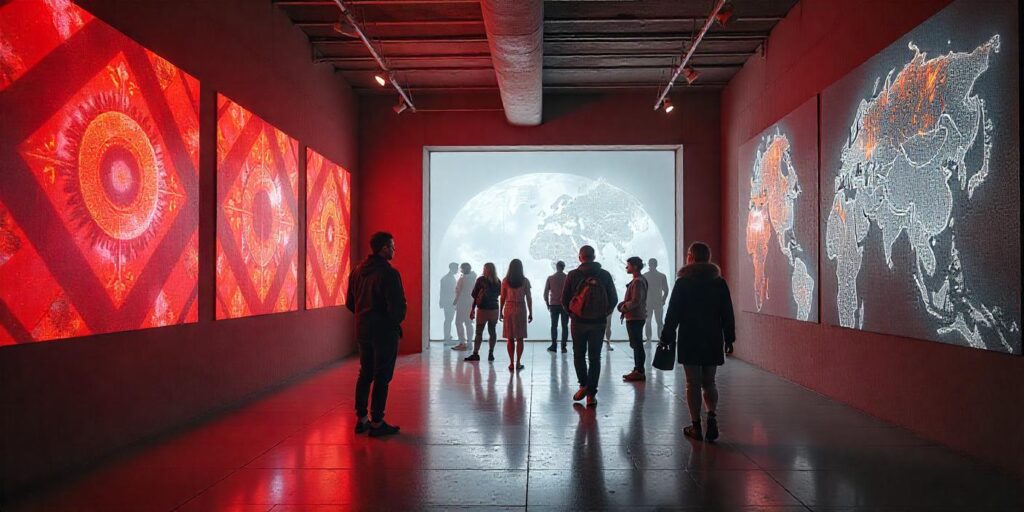In the blink of an eye, artificial intelligence (AI) has evolved from a sci-fi dream to a transformative force reshaping industries, economies, and daily life. How AI will change the world by 2030 is no longer a question of “if” but “how.” AI is set to revolutionize healthcare, education, transportation, and the economy, ushering in a new era of innovation and progress.

How AI Will Change the World by 2030 in Healthcare
One of the most promising aspects of AI is its potential to revolutionize healthcare. By 2030, AI-powered systems will be at the forefront of diagnosis, treatment, and personalized care. Imagine a world where doctors are empowered by AI tools that can analyze millions of medical records and detect patterns far beyond the capabilities of the human mind. Early detection of diseases like cancer, Alzheimer’s, and heart disease will become more accurate, saving countless lives.

For example, AI algorithms will be able to scan X-rays, MRIs, and CT scans in seconds, identifying even the slightest anomalies that may go unnoticed by a human doctor. These advancements will significantly reduce the time it takes to diagnose life-threatening conditions, leading to earlier interventions and more successful treatments. Furthermore, AI will make healthcare more personalized. It will analyze genetic information and medical history to provide customized treatment plans, ensuring patients receive the best care for their unique needs. The dream of accessible, affordable healthcare for all is becoming a reality, thanks to AI. As technology continues to evolve, healthcare will become more efficient, more accurate, and, most importantly, more compassionate.
AI vs. Human Intelligence: Can Machines Truly Enhance Productivity?
AI vs. Human Intelligence: Can Machines Truly Enhance Productivity?
How AI Will Change the World by 2030 in Education Like Never Before
Education is another sector that will undergo a radical transformation in the next decade. With AI, learning will become more personalized, engaging, and accessible to everyone. By 2030, AI-powered tutors and educational assistants will provide students with individualized learning experiences that cater to their unique strengths and weaknesses.
Imagine a classroom where every student has an AI companion who helps them learn at their own pace, adjusting the content based on their understanding. These AI assistants will help bridge the gap for students who need extra help, ensuring that no one falls behind. They will also offer real-time feedback and adjust lesson plans, making education more adaptive and flexible.

Moreover, AI will democratize access to quality education, especially in underserved regions. With the help of AI-powered platforms, students from remote areas will have access to the same resources and opportunities as those in well-funded schools. This could level the playing field and reduce educational inequality, making the world a more fair and just place.
How AI Will Change the World by 2030 in Transportation and Environment
The impact of AI on transportation will be nothing short of revolutionary. By 2030, self-driving cars will likely be a common sight on the roads, drastically reducing the number of accidents caused by human error. AI systems will analyze road conditions, traffic patterns, and driver behavior to ensure smoother, safer, and more efficient journeys.
But the revolution won’t stop there. AI-powered systems will be integral to the development of smart cities, where transportation networks are optimized to reduce traffic congestion, lower emissions, and improve the quality of life. Electric vehicles, powered by AI systems that manage energy consumption and performance, will become the standard, helping to combat climate change and reduce our dependence on fossil fuels.
Furthermore, AI will contribute to the development of sustainable energy solutions. From optimizing the use of renewable energy sources like solar and wind to predicting energy consumption patterns, AI will play a critical role in reducing our environmental footprint. By 2030, we’ll be looking at a world where AI helps balance our technological advancement with the preservation of the planet for future generations.
AI Will Create a More Inclusive Economy
AI is set to transform the global economy, but its most significant impact might be its potential to create a more inclusive world. While there are concerns about AI taking over jobs, the reality is that AI will create new industries, new opportunities, and new ways of working. The jobs of tomorrow may look vastly different from today, but they will also be more meaningful and fulfilling.
AI will take over mundane and repetitive tasks, allowing humans to focus on creative, strategic, and emotionally intelligent roles. For instance, AI in customer service will handle routine inquiries, leaving human employees to focus on building relationships with customers. In industries like finance and marketing, AI will analyze data at lightning speeds, allowing professionals to make better decisions and deliver more value to their clients.
Moreover, AI will enable businesses to operate more efficiently, reducing waste, improving supply chain management, and increasing productivity. Small businesses and entrepreneurs will have access to the same powerful AI tools as large corporations, helping them compete in a more level playing field.
The key to ensuring AI’s positive impact on the economy is education and reskilling. By providing people with the tools to understand and work alongside AI, we can create an economy that embraces technology and fosters innovation while ensuring that no one is left behind.
AI Will Enhance Creativity and Human Connection
At first glance, it might seem like AI would stifle human creativity and emotional connection. But the truth is, AI will enhance both in ways we can’t yet imagine. In the world of art, music, and literature, AI is already being used to help creators push boundaries and explore new possibilities. By 2030, AI will be an integral part of the creative process, helping artists, writers, and musicians experiment with new ideas and reach broader audiences.
In fact, AI could serve as a bridge between cultures, allowing people from different backgrounds to collaborate in new ways. By providing translation tools that break down language barriers and connecting people from across the globe, AI will make human connection more meaningful and inclusive.
AI will also play a role in enhancing mental health and well-being. AI-powered apps and tools will provide personalized mental health support, offering real-time therapy, stress management techniques, and emotional support. As the world becomes more connected, AI will play a crucial role in fostering empathy, understanding, and support.

Embracing a Bright Future with AI
The future of AI is bright, and by 2030, it will have transformed every aspect of our lives. From healthcare to education, transportation to the economy, AI will be the driving force behind a more efficient, equitable, and compassionate world. The key to this transformation will be our ability to embrace AI responsibly, ensuring that it serves humanity’s best interests and fosters a world where technology uplifts everyone.
As we look to the future, it’s important to remember that AI is not something to fear, but something to embrace. It is not here to replace us, but to work alongside us, amplifying our potential and helping us create a better world for future generations. Let’s take the steps today to ensure that by 2030, AI will truly change the world—for the better.